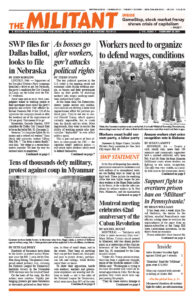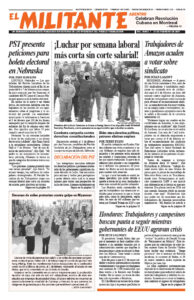February 26, 1996
LOS ANGELES — José Luis Ponce, one of Cuba’s principal diplomatic spokespeople in the United States, conducted a speaking tour of southern California in early February.
Ponce sketched the social gains of the Cuban revolution — in education, health care, the fight to eradicate racism and women’s oppression, and the internationalism of the workers and farmers in Cuba. It took a revolution to achieve these gains, he explained, because of the legacy of unemployment, absence of health care for millions especially in the countryside, illiteracy, racism and the superexploitation of women.
Ponce described the difficulties since the collapse of the former Soviet Union. We’re simply trying to regroup our forces so after a while we can continue our socialist development,” Ponce said.
February 26, 1971
In separate court battles this month, three GIs victimized by the brass for their antiwar activity — Howard Petrick, Sp/4 David Cortright and Seaman Roger Priest — won legal victories.
These are due to the direct support the cases received from the antiwar movement. Today there is a widespread awareness among GIs of the rights they have. This has contributed to the growth of a real antiwar movement within the military forces of U.S. imperialism.
The GI antiwar movement, a key factor limiting [President] Nixon’s ability to expand U.S. aggression in Southeast Asia, shows no signs of abating.
The battle to defend and extend GI rights will continue. Getting the word out on them can help assure that GI participation in the April 24 mass actions will be the biggest ever.
February 23, 1946
Wave after wave of mass protests has swept India since last November. The cause of the demonstrations lies in the unbearable conditions of poverty, disease and near starvation. Each new outburst against British rule has exhibited the mounting fury of the Indian masses.
The oppressed masses are strengthening their unity in the anti-British demonstrations. On February 13, the Associated Press reported that Hindus and Moslems were jointly protesting a seven-year sentence imposed on an Indian National Army officer by the British.
The immediate cause of the demonstrations was the imprisonment and court-martial of soldiers of the Indian National Army. The INA was uncompromisingly anti-British. The Indians regard its soldiers and officers as heroes in their struggle for independence.

